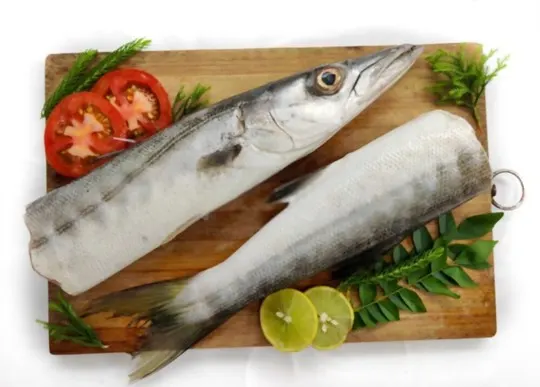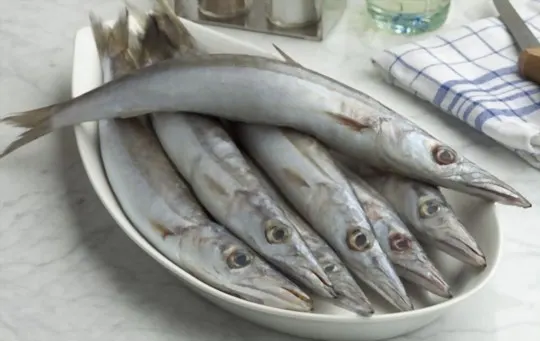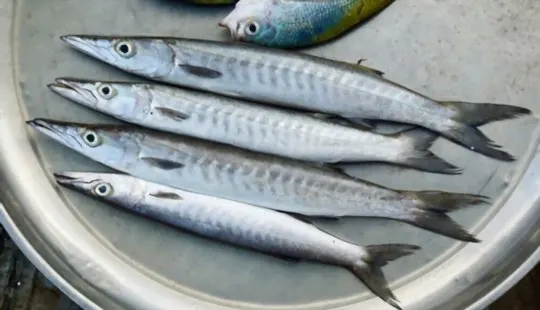Are you curious about the flavor of barracuda?
How does this fish taste, and is it safe to eat?
This ancient denizen of the deep offers many complex flavors and unique textures, depending on its origin.
In this comprehensive guide, we’ll cover all aspects of barracuda-eating – from discussing what it tastes like to explaining how to prepare and cook different varieties of this delicious fish.
Get ready for a sensory adventure; let’s discuss the fascinating world of barracuda!
What is Barracuda?

Barracuda is a saltwater fish found in tropical and subtropical oceans around the world.
It is known for its elongated body, sharp teeth, and predatory behavior.
This fish species belongs to the Sphyraenidae family and can reach up to six feet in length.
Barracudas are generally found near coral reefs, mangroves, and seagrass beds.
They are top predators and feed on smaller fish, squid, and crustaceans.
Some species of barracuda can be dangerous to humans if they feel threatened or provoked.
As a sportfish, barracuda is considered an excellent catch due to its challenging fight and high-quality flesh.
It is also a popular food fish in many regions of the world where it is caught commercially.
What Does Barracuda Taste Like?

Barracuda is a type of fish that is known for its rich taste and flaky texture.
Many people compare the taste of barracuda to that of swordfish or tuna, but with a stronger flavor profile.
The taste can also vary depending on the method of preparation and seasonings used.
When cooked correctly, barracuda has a firm yet tender texture that melts in your mouth.
It has a buttery flavor and is often described as savory and slightly sweet.
Some people also note a slight metallic or gamey taste, which can be attributed to the high levels of mercury found in larger barracudas.
The flavor profile of barracuda can also vary depending on where it was caught.
For example, barracudas caught in warmer waters tend to have a more robust and complex taste compared to those caught in colder regions.
Overall, barracuda is a delicious fish that is worth trying if you enjoy seafood with rich flavors and textures.
Factors that Affect the Taste of Barracuda
The taste of barracuda can be affected by several factors.
- The environment where it was caught plays a significant role in the taste. For instance, barracuda caught in shallow waters may have a different taste compared to those caught in deeper waters due to differences in their diets.
- The diet of the barracuda can affect its flavor. If it predominantly feeds on small fish and crustaceans, it tends to have a mild, sweet flavor. Fish that consume larger prey can have a stronger taste.
Another factor that affects the taste of barracuda is how long it has been kept before consumption.
If stored appropriately at optimal temperatures, its strong and unique flavor will be preserved, and this will ultimately translate into better-tasting flesh.
Lastly, the cooking method used for preparing barracuda also contributes significantly to its flavor.
Grilling or roasting with herbs and spices or marinating increases its flavor profile, while overcooking or using techniques that dry out the meat can diminish the taste.
Considering these above factors when buying and preparing barracuda is essential in bringing out its full potential in terms of flavor.
Without proper care taken when selecting these factors such as when shopping for seafood or following recommended storage guidelines before cooking could lead one to miss out on an enjoyable eating experience.
How to Cook Barracuda to Enhance its Flavor?

To enhance the flavor of barracuda, there are some cooking methods that you can follow.
One way is to marinate the fish for several hours before cooking.
This can be done by mixing lemon juice, herbs, and spices to create a marinade.
The acid in the lemon juice helps to break down the tough fibers and infuses flavors into the flesh.
Another method is to grill or broil the barracuda after seasoning it with salt, pepper, and other herbs.
This method allows the natural flavor of the fish to shine through while adding some smoky notes.
However, it’s important not to overcook barracuda as it could become dry and tough.
Alternatively, you could try pan-searing the barracuda after dusting it with some flour or cornmeal.
This creates a crispy outer layer that complements the tender flesh inside.
You could also pair this with a sauce like aioli or tartar sauce for added flavor.
Lastly, you could poach the barracuda in water or broth infused with herbs and spices.
This method keeps the flesh moist and tender while also imparting flavors into it.
Overall, selecting fresh barracuda and avoiding overcooking are key factors in enhancing its flavor.
Is Barracuda Healthy?
Barracuda is a popular fish among seafood lovers, but many people wonder if it’s a healthy option.
So, Is Barracuda Healthy? Let’s take a closer look.
From the table, we can see that barracuda is relatively low in fat and calories compared to other fatty fishes like salmon.
It’s also high in protein, which is essential for muscle building and repairing body tissues.
However, one thing to note is that barracuda contains moderate levels of mercury; therefore, eating it in excess can be harmful to health.
Moderate consumption of barracuda (up to two servings per week) will provide valuable nutrients such as omega-3 fatty acids and vitamins B12 and D without exposing you to high levels of mercury.
Where to Buy Barracuda and How to Store It?

If you’re wondering where to buy barracuda and how to store it, keep reading.
Barracudas are widely available in coastal areas where they’re caught, but they can also be found in many seafood markets.
Make sure to look for a reputable seller that sources their barracuda from sustainable fisheries.
When buying barracuda, always check its freshness by looking at the eyes and gills.
The eyes should be clear and not sunken, while the gills should be bright red or pink.
The skin should also have a shiny appearance and no odor.
To store barracuda properly, it’s recommended to wrap it in plastic wrap or put it in an airtight container before refrigerating it at 32°F-39°F (0°C-4°C).
You can freeze barracuda for up to six months by wrapping it tightly in freezer paper or aluminum foil.
To cook barracuda, there are countless methods such as grilling, baking, frying, and broiling depending on personal preference.
Beware of consuming undercooked barracuda as this species may carry ciguatera poisoning.
To prevent this toxic reaction, make sure to cook the fish thoroughly or avoid eating large predatory reef fish like barracudas altogether.
In summary, buying high-quality barracuda involves checking its freshness and sourcing from reputable suppliers.
Properly storing raw barracuda requires refrigeration or freezing, which helps maintain its taste and texture for longer periods of time.
There are many ways to prepare cooked barracuda but being cautious with cooking time is essential due to possible Ciguatera poisoning risk.
Conclusion
To sum up, barracuda is a type of predatory fish that can be found in tropical and subtropical waters.
It is also a popular food fish, but its consumption comes with some risks due to its potential toxicity.
If you do choose to eat barracuda, it is important to buy it from a reputable source and properly store it to avoid spoilage or contamination.
It is also worth noting that cooking methods can affect the taste of barracuda.
Grilling or broiling are popular methods that help bring out the fish’s firm texture and bold flavor.
Ultimately, though, the taste may vary depending on factors such as where the fish was caught and how fresh it is.

What Does Barracuda Taste Like? A Comprehensive Guide
Ingredients
- Barracuda
- Ingredients from your selected recipes
Instructions
- Select ingredients that work well together.
- Use a recipe or method that will enhance their natural taste.
- Taste and adjust the recipe as needed to achieve the desired flavor.

Carrie is a food writer and editor with more than 15 years of experience. She has worked for some of the biggest names in the food industry, including Bon Appétit, Food & Wine, and Martha Stewart Living.
As the Editor in Chief of IntroChicago.com, Carrie oversees all of the content on the site. She also manages the team of contributing writers and editors, who help to create delicious recipes, helpful tips, and informative articles that you’ll find on the site.
A native of the Chicago area, Carrie is passionate about all things food. She loves trying new restaurants and experimenting with new recipes in her kitchen. She’s also a graduate of the Culinary Institute of America, so she knows a thing or two about food!
